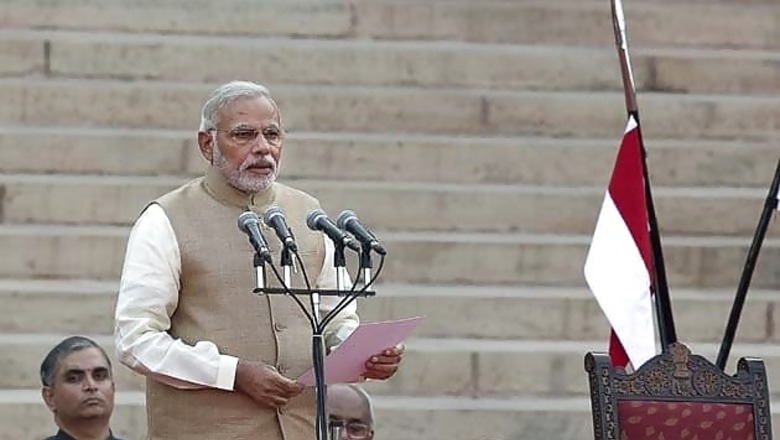
views
The new Council of Ministers led by Narendra Modi has assumed office amidst much fanfare. While a lot of focus has been on who all were there for the swearing-in ceremony, the Council of Ministers draws attention for many more reasons. The clear stamp of the authority and pre-eminence of the Prime Minister is visible in his new ministry. The distribution of portfolios provides further proof of the same.
The fulfilling of a promise of a lean Council of Ministers is a refreshing departure from the past. The decisive mandate that the BJP received has made it possible for the leadership to take this decision and disappoint, in the process, many aspirants who were hoping to make it. In the 45 member Council of Ministers, more than three fourths (including the Prime Minister himself) are becoming a minister for the first time at the Centre. In the 24 member Cabinet, only seven were cabinet ministers another three were Ministers of State in the earlier NDA regime. This implies that more than half the Cabinet is occupying a Ministerial berth for the first time.
This is both a challenge and an opportunity. Challenge as the fear of lack of experience would be frequently heard and opportunity as they have the 'chance' to depart from the past. The order in which the Ministers were sworn in is also indicative of the Prime Minister asserting himself. Rajnath Singh preceding Sushma Swaraj and Arun Jaitley (the Leaders of the Opposition in the two Houses in the previous Parliament) is a clear pointer to this fact. Further, many of those who were Cabinet Ministers in the earlier NDA government (Ananth Kumar and Jual Oram) being sworn in after new comers also indicates the new 'seniority' bin the Modi led Cabinet. The non inclusion of a veteran like Murli Manohar Joshi, is again indicative of the 'change of guard'. The limited spaces provided to the allies, is again a reflection of the BJP and its Prime Minister clearly taking the driver's seat. The strong representation to women is a very welcome feature of the new ministry. While there are regional imbalances, this was bound to occur given the fact that the BJP did exceptionally well in some regions and has limited representation in others. The fact that two of the new Ministers (Arun Jaitley and Smriti Irani) have lost in the recent Lok Sabha polls (but are sitting Rajya Sabha members) and were still included in the ministry, is indicative of the compulsions of politics. While the BJP opposed the inclusion of Shivraj Patil and PM Sayeed in the UPA government of 2004, who too had lost the Lok Sabha polls, they now recognize the political inevitability of such crucial decisions. A BJP supporter would of course argue that the new government and its leadership represents a departure from the past. It is hoped that criticism of such steps taken by any new government (irrespective of its political colour) would be a thing of the past. It is also relevant to note that both Arun Jaitley and Smriti Irani have been given critical portfolios.
The portfolios announced also indicate the power equations in the new government. Critical portfolios that have the potential to show the new government making a visible impact by some 'high ticket' announcements and decisions are all in the hands of those close to the Prime Minister. It is also interesting that the ministers from the parties of allies, have relatively 'light' portfolios. A past practice which has unfortunately been continued by this government is giving of important portfolios to Ministers of State with independent charge. This includes crucial Ministries like Petroleum, Information and Broadcasting, Industry, Commerce and Power. The government had the opportunity to ensure that all Ministries were under Cabinet ministers and avoid this anomaly of having Cabinet Ministers handling relatively light portfolios and Minister of State given independent charge of weighty Ministries.
With the Council of Ministers taking shape, one will now look to the performance of the new government. While 'less government' through a small ministry is evident, will 'more governance' really follow?




















Comments
0 comment